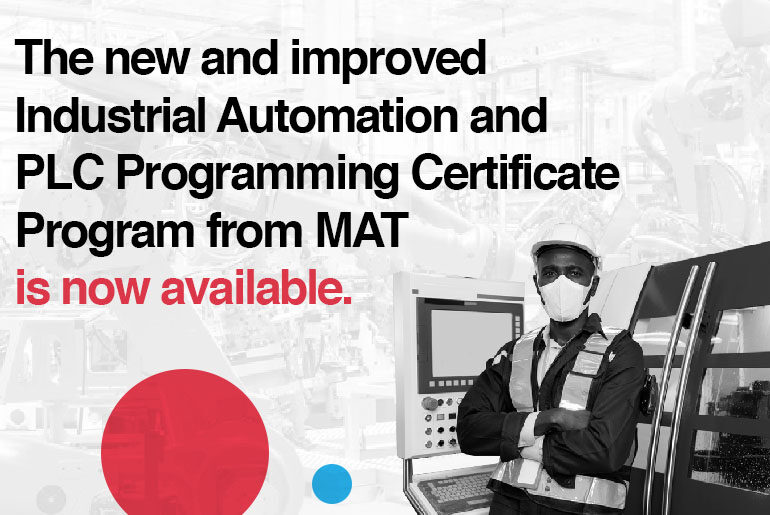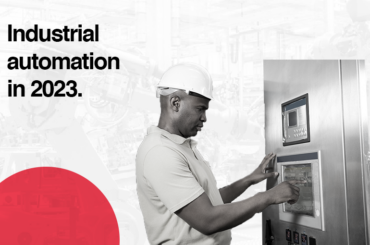The Certificate in Industrial Automation and PLC Programming program is the newest offering from MAT’s School of Engineering. This course is intended to give engineers the knowledge and abilities they need to begin a prosperous career in the area of industrial automation. Additionally, it is intended to assist them in developing solid foundations in SCADA, industrial communication, Human Machine Interface (HMI), and PLC programming.
Industrial Automation: What Is It?
Automation of industrial processes is what the term “industrial automation” implies. The goods you consume on a daily basis are produced in industries.
It is either manually produced by a worker in a factory or is produced by a machine. These devices operate automatically to facilitate production tasks. So industrial automation is used to accomplish this.
PLC, SCADA, HMI, VFD, and DCS are just a few examples of the equipment used in industrial automation. Their goal is to minimize errors brought on by human intervention. Additionally, a significant amount of production time is cut, and reliability and efficiency are also increased.
Who Can Have an Automation Career?
The field of automation crosses several disciplines. It requires expertise in a variety of engineering fields, including
Instrumentation Engineering
Electrical Engineering
Mechanical Engineering
Electronics Engineering
Electronics & Telecommunication Engineering
Mechatronics Engineering
Therefore, individuals with these backgrounds who are engineering students or professionals can pursue a career in industrial automation.
Program Details
This course lasts for ten months. Participants will undergo a rigorous 7-month training program where they will master the fundamentals of automation and practical programming exercises, labs, case studies, and assignments.
The following three months will be spent in workshops and project-based learning, where participants will master the essentials of working on actual projects.
The use of Factory IO, Automation Direct PLC Designer for Do-More PLC, Allen Bradley Connected Component Workbench, Siemens Simatic TIA Portal for Siemens S7 PLCs, and RS Logix 5000 for Allen Bradley ControlLogix will also be incorporated into the learning process.
Program Outcomes
The expected learning outcomes for each participant in the full-stack industrial automation course are listed below.
Participants should have a complete overview of the industrial automation technologies as they apply in the world of industry.
Participants should know how sensors and actuators work and are used industrially and how they are connected to industrial processes for measurement monitoring and control purposes.
Participants will have developed knowledge of the workings of PLCs with examples of typical vendor PLCs.
Participants will be able to write PLC program logic following the IEC standard, download it to the PLC, and carry out troubleshooting and functional testing of the logic developed.
Participants will develop the ability to read process control narratives or process functional descriptions and convert them into control logic using ladder logic diagrams or function block diagrams.
Participants will be able to design and develop HMI screens following industry standards and connect the developed HMI to processed data from the PLCs.
Participants will develop a practical understanding of industrial protocols with an emphasis on OPC, Modbus, HART, RS232/485, and TCP/IP.
Participants will develop a practical understanding of control networks, with an emphasis on Ethernet networks.
Participants will be able to develop the required skills to troubleshoot PLC systems irrespective of the vendor product.
Participants will be able to feature in any industrial automation project after learning the industry-base concept involved in a project by taking part in the project outline for the course with intensive guidance from an industry mentor. Some key concepts participants will learn during this phase will be
Development of Functional Design Specification
I/O Database Analysis.
System Sizing and Calculations
I/O segregation and Allocation
Control System Network & Architecture
Control Typical Development
Control Narrative & Philosophy
The concept behind system integration and FAT
Learning from the Best Industrial Automation Experts
We worked with a specialist from a reputable industrial automation company to create the curriculum for this program, which is of the highest caliber. In order to concentrate the curriculum on the most in-demand industrial automation skills, he has provided direction and criticism.
Enroll right away in the certificate program in industrial automation and PLC programming!
There has never been a better moment to enter the industrial automation industry.
It is no secret that businesses are increasingly turning to industrial automation as a means of increasing productivity and lowering operating expenses.
The need for automation has never been higher thanks to ongoing technological breakthroughs.
In order to satisfy current trends, safety procedures, and consumer expectations, businesses are already incorporating automated devices and equipment in almost every industry.
With MAT’s combination of hands-on project-centric learning and mentorship, there’s no better way to meet the demand than by registering today for the industrial automation and PLC programming certificate courses. Enroll now to learn more!





